The Intel 9th Gen Review: Core i9-9900K, Core i7-9700K and Core i5-9600K Tested
by Ian Cutress on October 19, 2018 9:00 AM EST- Posted in
- CPUs
- Intel
- Coffee Lake
- 14++
- Core 9th Gen
- Core-S
- i9-9900K
- i7-9700K
- i5-9600K
CPU Performance: Office Tests
The Office test suite is designed to focus around more industry standard tests that focus on office workflows, system meetings, some synthetics, but we also bundle compiler performance in with this section. For users that have to evaluate hardware in general, these are usually the benchmarks that most consider.
All of our benchmark results can also be found in our benchmark engine, Bench.
PCMark 10: Industry Standard System Profiler
Futuremark, now known as UL, has developed benchmarks that have become industry standards for around two decades. The latest complete system test suite is PCMark 10, upgrading over PCMark 8 with updated tests and more OpenCL invested into use cases such as video streaming.
PCMark splits its scores into about 14 different areas, including application startup, web, spreadsheets, photo editing, rendering, video conferencing, and physics. We post all of these numbers in our benchmark database, Bench, however the key metric for the review is the overall score.
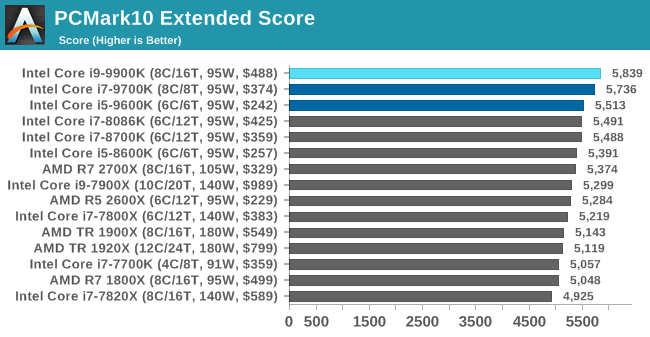
As a general mix of a lot of tests, the new processors from Intel take the top three spots, in order. Even the i5-9600K goes ahead of the i7-8086K.
Chromium Compile: Windows VC++ Compile of Chrome 56
A large number of AnandTech readers are software engineers, looking at how the hardware they use performs. While compiling a Linux kernel is ‘standard’ for the reviewers who often compile, our test is a little more varied – we are using the windows instructions to compile Chrome, specifically a Chrome 56 build from March 2017, as that was when we built the test. Google quite handily gives instructions on how to compile with Windows, along with a 400k file download for the repo.
In our test, using Google’s instructions, we use the MSVC compiler and ninja developer tools to manage the compile. As you may expect, the benchmark is variably threaded, with a mix of DRAM requirements that benefit from faster caches. Data procured in our test is the time taken for the compile, which we convert into compiles per day.
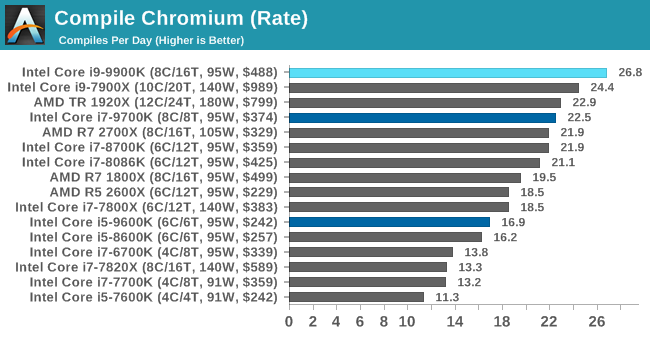
Pushing the raw frequency of the all-core turbo seems to work well in our compile test.
3DMark Physics: In-Game Physics Compute
Alongside PCMark is 3DMark, Futuremark’s (UL’s) gaming test suite. Each gaming tests consists of one or two GPU heavy scenes, along with a physics test that is indicative of when the test was written and the platform it is aimed at. The main overriding tests, in order of complexity, are Ice Storm, Cloud Gate, Sky Diver, Fire Strike, and Time Spy.
Some of the subtests offer variants, such as Ice Storm Unlimited, which is aimed at mobile platforms with an off-screen rendering, or Fire Strike Ultra which is aimed at high-end 4K systems with lots of the added features turned on. Time Spy also currently has an AVX-512 mode (which we may be using in the future).
For our tests, we report in Bench the results from every physics test, but for the sake of the review we keep it to the most demanding of each scene: Ice Storm Unlimited, Cloud Gate, Sky Diver, Fire Strike Ultra, and Time Spy.
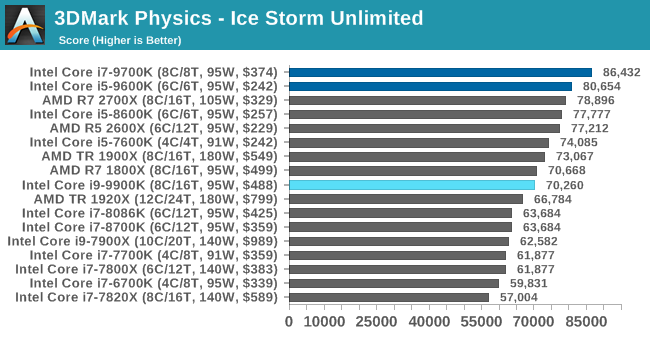
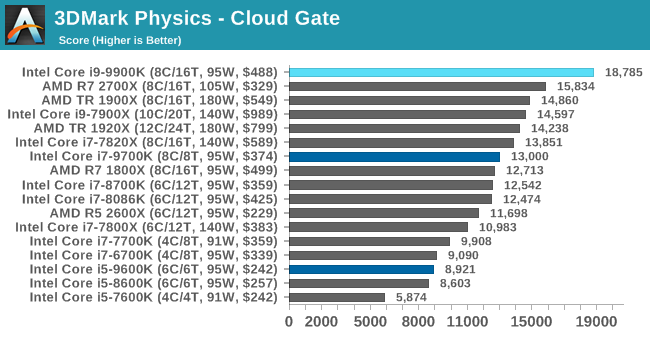
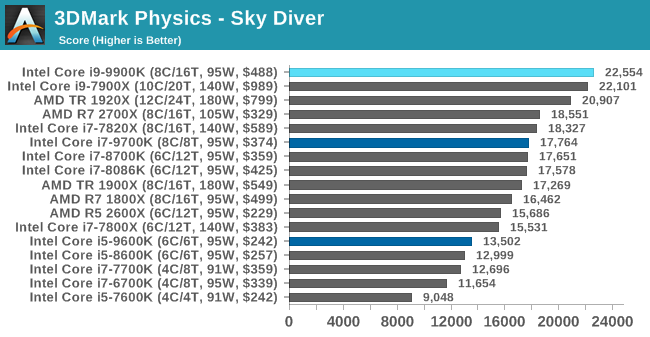
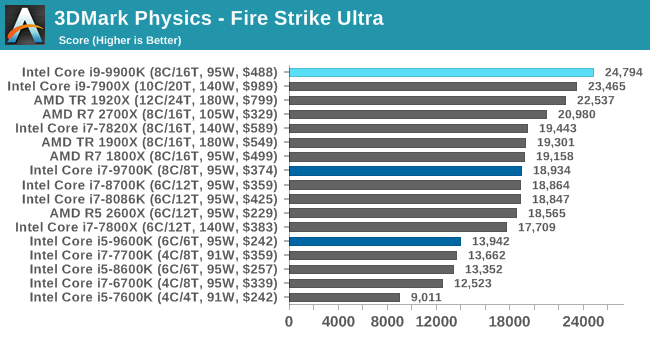
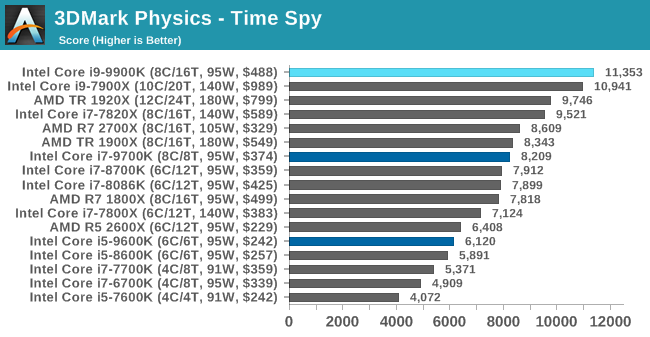
The older Ice Storm test didn't much like the Core i9-9900K, pushing it back behind the R7 1800X. For the more modern tests focused on PCs, the 9900K wins out. The lack of HT is hurting the other two parts.
GeekBench4: Synthetics
A common tool for cross-platform testing between mobile, PC, and Mac, GeekBench 4 is an ultimate exercise in synthetic testing across a range of algorithms looking for peak throughput. Tests include encryption, compression, fast Fourier transform, memory operations, n-body physics, matrix operations, histogram manipulation, and HTML parsing.
I’m including this test due to popular demand, although the results do come across as overly synthetic, and a lot of users often put a lot of weight behind the test due to the fact that it is compiled across different platforms (although with different compilers).
We record the main subtest scores (Crypto, Integer, Floating Point, Memory) in our benchmark database, but for the review we post the overall single and multi-threaded results.
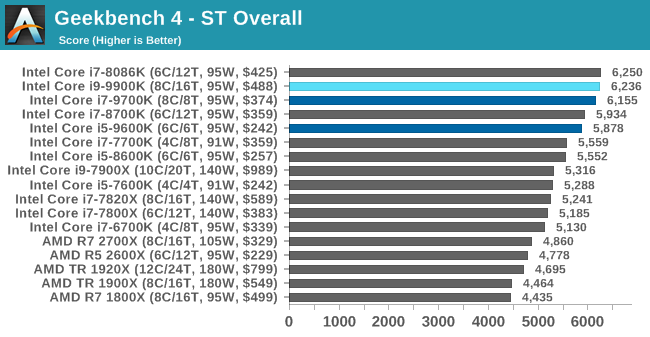
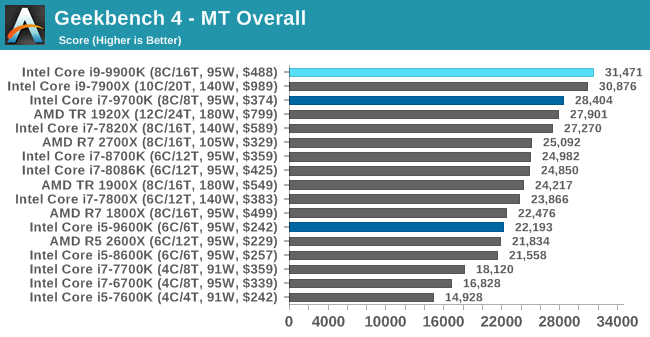










274 Comments
View All Comments
AshlayW - Friday, October 19, 2018 - link
Huh. It's definitely the 'fastest gaming processor' but not even by that much. I will use Far Cry 5 as a comparison as it's a game I play a lot these days and is even quite a intel-leaning game as it prefers clock speeds in most cases. the i9 9900K is only 19% faster than the Ryzen 5 2600X according to your data. Taking a modest OC on a Ryzen 5 2600 and you are at that level of performance. In the UK right now, the i9 9900K is 300% more expensive than the Ryzen 5 2600. But only 19% faster in that game.Even if we drop it to MSRP (prices here for Intel CPUs are insanely high) it is still 200% more expensive than the Ryzen 5. I know it's a Halo product for the 'Simply the best' crowd, and yes it does that, i get that. But this 'intel tax' for this product is getting silly now. I made an investment with my 2600 vs the 8600K or waiting for the 9600K (which are both nearly £100 more expensive!) and I got twice the threads and comparable gaming performance. -shrug-
9th gen core parts are not even slightly appealing to me.
mapesdhs - Sunday, October 21, 2018 - link
Wise investment, you should be good for a while, especially if you move up resolutions where the GPU becomes the limiting factor, and even then you're going to have good future CPU options.VirpZ - Friday, October 19, 2018 - link
Why there are no temperature charts or any mention to cooling solution used ?odellus - Friday, October 19, 2018 - link
all of that work on the gaming benchmarks and you still somehow don't understand that benchmarking a CPU by actually benchmarking the GPU is probably not a good indicator of CPU performance. 8K in a CPU benchmark? is this a joke? christ.odellus - Friday, October 19, 2018 - link
and why are the actual-low settings benches labeled "IGP" if you're using a 1080? and why a 1080 and not a 1080 Ti or 2080 Ti? why limit the CPUs?svan1971 - Saturday, October 20, 2018 - link
why not allah or buddha ? why do they always pick my lord and savior to curse with?mapesdhs - Sunday, October 21, 2018 - link
Well because he's the best of course. 8)whatever223 - Friday, October 19, 2018 - link
You have "smart sound" twice in the "Chipset Comparison" table.GreenReaper - Friday, October 19, 2018 - link
It's in stereo!Holliday75 - Friday, October 19, 2018 - link
My review of the comments section.*Crying*
The end.